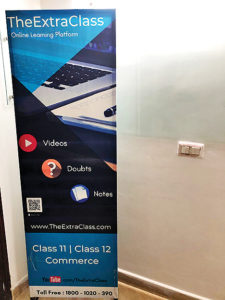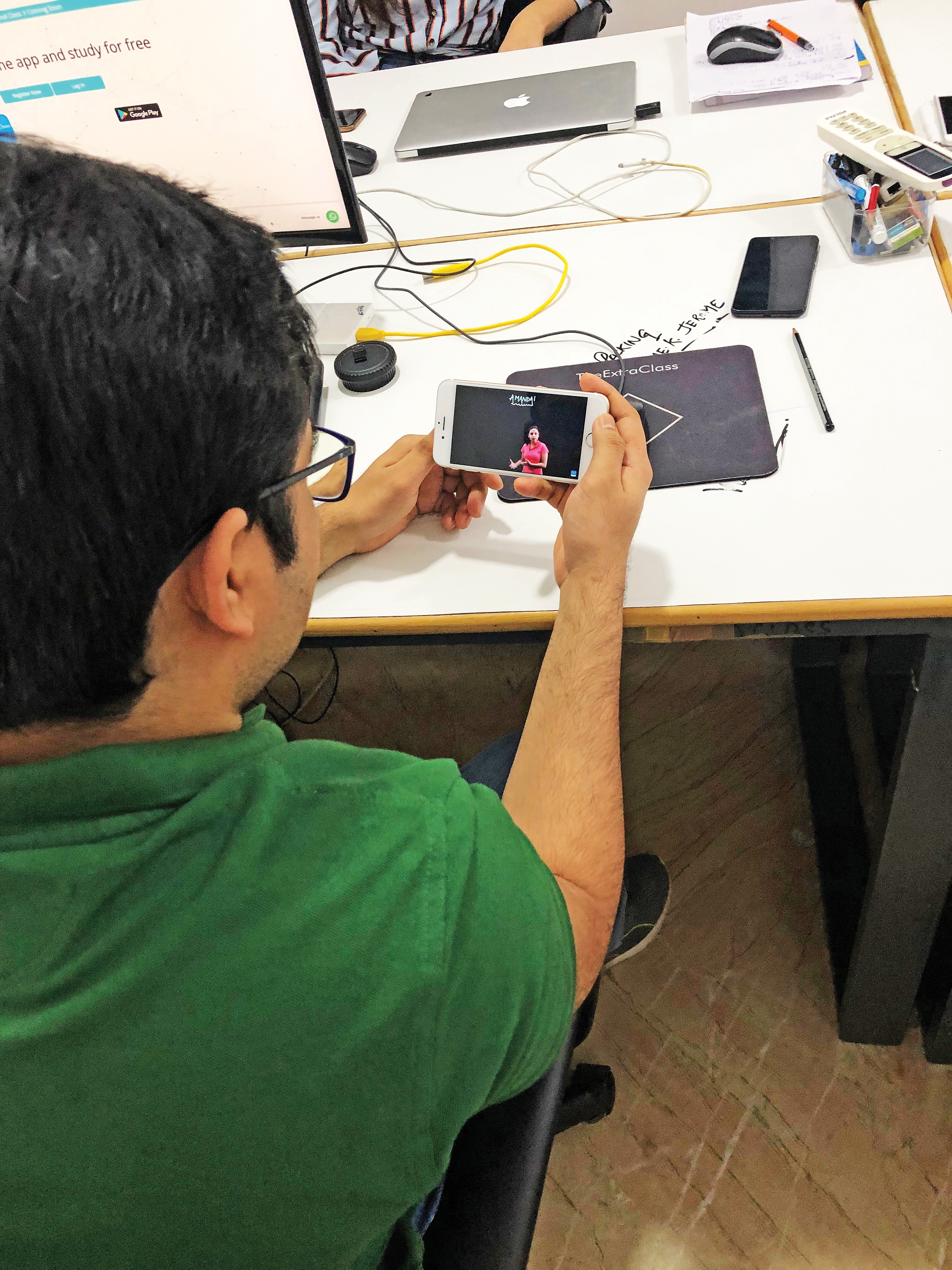Online education is bringing a change in the education sector as apps like The Extra Class and Unacademy for college students follow in the footsteps of Byju’s
The online platform has been making inroads into the world of students from different strata which includes schools, colleges and competitive exams preparation. Instead of burying his nose in books all the time, in the distant city of Bokaro in Jharkhand, Rahul Ranjan has been preparing for the Staff Selection Committee (SSC exam) with the help of online ed-tech app Unacademy while also being enrolled with a coaching centre.
Ranjan, who studied French (Hons) for his graduation, seems to be optimistic about the app but adds that, “It also leaves a lot of queries and issues unsolved, which in turn becomes a headache later on.”
Three alumni of the Delhi University — Jaideep Solanki, Vaishali Sehgal and Arushi Dhingra — collaborated to start an app named The Extra Class which focused on 11th and 12th standard Commerce students. Its distinctive feature was free video content along with other study materials like sample papers, PDF, notes, among others. The YouTube channel of The Extra Class was launched in August 2018 but the mobile application for the android phone came in July 2019 and made its mark in under two months on Play Store, when in September it trended at No. 2 in India.

“The idea behind the app was to provide a free online education environment where even students who are unable to afford the coaching centres or other apps which require mandatory subscription get the best learning,” says Solanki, who did his BCom (Hons) from Sri Venkateswara College in DU. He further adds that “It was not about giving any competition to other startup and neither about making money, for us it always remained a means to provide a better content which will eventually result in monetary benefits.”
The Extra Class currently has 126k subscribers on YouTube while the app has been downloaded by more than 100k users on Play Store, with a 4.2 star rating. When asked whether pricing will be introduced at a later stage, Jaideep’s brother Parteek Solanki, who was the brain behind the startup said, “We can introduce packages when we get a good audience, but it will never be out of reach.”
Without revenue, a founding member of such a startup certainly doesn’t have any secure future. It is a risk which their parents don’t approve of. Vaishali Sehgal, who did her MA in English Literature (Hons) from Kamla Nehru College in DU was one such student, who had to “lie” to her parents about working in a startup. “My parents wanted me to sit for UPSC and become an IAS officer but I was always interested in teaching. When I started working with Jaideep in The Extra Class, I used to lie to my parents that I am going to college and instead the entire second year of MA, I invested in making videos and content for students.” Vaishali has now revealed her job to her parents, who still nag her to get a government job.
Arushi Dhingra, who graduated from Bharti College in DU, said, “It’s tough to face the camera. Even teaching is not a cakewalk, especially when you come from a non-teaching background. I couldn’t properly face the camera for the first time and underwent several rehearsals.” Arushi narrates the preparation done behind the camera and says, “We prepare notes, and are required to read at least two to three books to get the concepts clear.”
With several e-learning apps like Byju’s, Unacademy and Topper, it’s tough to survive in a competitive world without any funding. The apps which survive will need heavy funding by big tech giants like Facebook, Softbank, among others. Recently the Unacademy, which was started by former IAS officer Roman Saini, raised $50 million in Series D funding round from Steadview Capital, Sequoia India, Nexus Venture Partners and Blume Ventures.

Although Unacademy has 10,000 registered educators and 13 million learners, the numbers don’t reflect the entire story. Ankit Singh, preparing for the UPSC in Mukherji Nagar says that he once used the app but uninstalled it later as and when he came to know about the “duping reality.”
“These apps come with a rider and equating them with classroom studies will be a blunder. They are good for scanning current affairs and quick knowledge but never beneficial in understanding the core concept,” said Ankit. He added, “These days e-apps are selling themselves like a product owing to competition rather than focusing on the content, which again comes down to marketisation of education.”
With the 4G revolution and a second coming of the Internet era under the banner of Reliance Jio, information technology has taken another turn to communicate messages across the globe. An advantage these nine apps provide to the underprivileged is that, “Not all of them are qualified to pay the fees at the coaching centres these days, which hovers above Rs 1.5 lakh but with online apps, YouTube and their applications, it becomes resourceful,” said Ankit, who is all set to take the UPSC exam.
Jaideep of The Extra Class said that they used to add around “3,000 subscribers on YouTube every day during the board exams in March.” When asked about the traffic, he said, “The greatest number of traffic comes from Madhya Pradesh, Uttar Pradesh, Bihar and the tier 2 and tier 3 cities.” He added, “It’s the language which gives them an upper hand when compared with other apps as the latter keeps everything in English while we at Extra Class prefer Hindi and English in explaining the concepts.”
Parteek Solanki praised other platforms, telling Patriot, “All the platforms are doing good as long as they are uplifting the concept of online education, which will become a revolutionary tool in the times to come.”
But can these Gen Next platforms create an impact amongst the backward classes where possessing a smartphone is still considered to be a privilege of the rich? Moreover, these extra classes depend on Internet penetration, will it become a daily affair even in the tier 2 and tier 3 cities? Dr Smita Mishra, Assistant Professor, Department of Basic Sciences and Humanities, PSIT, Kanpur feels that online platforms do provide a plethora of information but it’s classroom study which clearly races ahead in educating a student, whether in school, college or for competitive examinations preparation.
Speaking to Patriot, Dr Mishra said, “It’s a well-known fact that education in India isn’t cheap. So, when students were introduced to the concept of e-learning through platform like Byju, Extra Class, and Unacademy, it was like a plethora of information was instantly made available at our fingertips. And it was further boosted by the surge of Internet data brought by Jio offers which made it even more easy for us to access all that information at a cheap price.”
Putting in a word of caution, the Assistant Professor said, “But as the saying goes ‘Nothing good ever comes without consequences’, so does e-learning when compared to classroom study. The main feature it lacks is one-to-one interaction with the tutor irrespective of the subject being taught. For example, if a doubt is raised while watching the lecture, there is no way to clear it at that very point which is available in classroom study. So, it won’t be feasible for us to completely remove or replace our classroom study — or coaching classes, for that matter.”
Giving hope to Gen Next, she added, “It (online education) can surely be treated as an option to increase our knowledge in a specific topic but to completely depend on e-learning won’t be a wise choice.”





